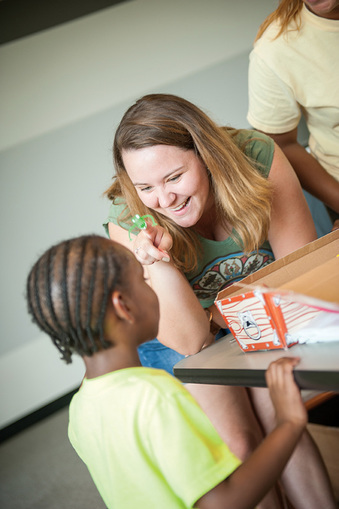
True leadership requires a commitment to serving one’s community. CHES students learn and experience that when they take the course Leadership Development through Service taught by Star Bloom. As part of the course, the students volunteer at Al’s Pals, a program that Bloom founded and directs.
Launched in 2011, the after-school mentorship program pairs UA college volunteers with at-risk elementary school students. Each volunteer meets with the same child twice a week throughout the semester, assisting with homework and skill building and providing recreational and enrichment activities.
Al’s Pals began with 30 school children and 60 mentors and now has 500 mentors who volunteer at three elementary schools and the McKenzie Court Community Center in Tuscaloosa. Last fall, the mentors logged 14,000 hours of service.
“The program is a success because this is a volunteer experience where you see that one person really can make a difference. You see the children’s grades and school attendance go up. Perhaps more importantly, their attitude toward school and their social skills improve, and behavioral referrals go down,” says Bloom.
In Bloom’s course, students learn to develop leadership skills and practice them through mentoring. The training for Al’s Pals leaders follows the ideas taught and tested in the CHES course. “There are no initiatives in the program that are not first tested in class,” Bloom says.
For example, Bloom’s students learn that research shows a relationship between gratitude and resilience, so they write a gratitude letter. The mentors then teach the children to articulate what they’re grateful for, much of which tends to be school-related, like being with friends, liking their teachers or liking activities. The mentors see the children begin to develop a strong appreciation for school. The gratitude they develop translates to resilience as they face difficulties in other areas of their lives.
Each child in the program has two mentors. As the relationships grow, often the mentors choose to renew their commitments beyond one semester. Before mentoring, volunteers go through extensive training. An organized network of experienced student leaders and graduate assistants leads the program.
Bloom advises the mentors to set their expectations for their students high. “The college mentor’s expectations will probably be the highest expectations in the child’s life,” she says. “When the children spend time and connect with their college mentor, they can see a brighter future for themselves.
“In order to lead, you must first realize that you really can make a difference. Once you’ve served and have seen that one person can make a difference, it’s much harder to just let someone else do the job.”
Launched in 2011, the after-school mentorship program pairs UA college volunteers with at-risk elementary school students. Each volunteer meets with the same child twice a week throughout the semester, assisting with homework and skill building and providing recreational and enrichment activities.
Al’s Pals began with 30 school children and 60 mentors and now has 500 mentors who volunteer at three elementary schools and the McKenzie Court Community Center in Tuscaloosa. Last fall, the mentors logged 14,000 hours of service.
“The program is a success because this is a volunteer experience where you see that one person really can make a difference. You see the children’s grades and school attendance go up. Perhaps more importantly, their attitude toward school and their social skills improve, and behavioral referrals go down,” says Bloom.
In Bloom’s course, students learn to develop leadership skills and practice them through mentoring. The training for Al’s Pals leaders follows the ideas taught and tested in the CHES course. “There are no initiatives in the program that are not first tested in class,” Bloom says.
For example, Bloom’s students learn that research shows a relationship between gratitude and resilience, so they write a gratitude letter. The mentors then teach the children to articulate what they’re grateful for, much of which tends to be school-related, like being with friends, liking their teachers or liking activities. The mentors see the children begin to develop a strong appreciation for school. The gratitude they develop translates to resilience as they face difficulties in other areas of their lives.
Each child in the program has two mentors. As the relationships grow, often the mentors choose to renew their commitments beyond one semester. Before mentoring, volunteers go through extensive training. An organized network of experienced student leaders and graduate assistants leads the program.
Bloom advises the mentors to set their expectations for their students high. “The college mentor’s expectations will probably be the highest expectations in the child’s life,” she says. “When the children spend time and connect with their college mentor, they can see a brighter future for themselves.
“In order to lead, you must first realize that you really can make a difference. Once you’ve served and have seen that one person can make a difference, it’s much harder to just let someone else do the job.”

